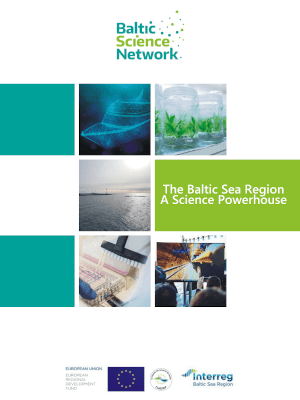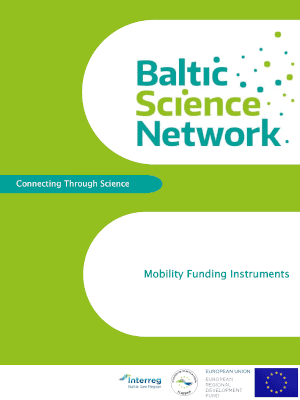BSN
Society expects research and higher education to respond to global challenges, such as climate change, energy and resource efficiency, food supply, welfare, health and demographic change. The countries around the Baltic Sea have an excellent structure of leading universities and research institutions which makes the Baltic Sea region one of the most competitive and innovative science regions in the world. However, not all levels of research and innovation perform equally well across the macro region, the existing facilities are not evenly distributed and not all are well interconnected.
For the time being, science policy around the Baltic Sea is organised mainly from a regional, national or European angle. Yet, national or sub-national answers are not sufficient anymore to respond to global questions, and the European angle is typically too wide to consider the specific features of every single country. A macro regional dimension in science policy could be the right scale to respond to the challenges of society. This would require a joint approach of the countries surrounding the Baltic Sea towards higher education and research and more cooperation in research and higher education. However, there is a lack of political ownership of such a macro-regional dimension of science policy.
Budgets
in numbers
-
3.00MillionTotal
-
2.34MillionErdf
-
0.00MillionEni + Russia
-
0.00MillionNorway
Achievements
The project established a network - the Baltic Science Network – which gathers regional and national ministries and other public bodies responsible for defining and implementing higher education, science and research policies. Seven countries (Estonia, Finland, Germany, Latvia, Lithuania, Poland, Sweden) have confirmed their intention to continue the joint work and to turn the project into a permanent and independent network. These countries formulated a joint statement within a High-Level Meeting of the Representatives of the Ministries for Science of the Council of Baltic Sea States (CBSS) and formulated statutes for the network.
The Baltic Science Network analysed the current state of science and research cooperation in the Baltic Sea region and issued recommendations accordingly. The project also identified potential solutions to improve the cooperation in this sector and to increase the participation of less performing regions in transnational research activities. Besides, the Baltic Science Network developed a mobility concept for researchers and students. The partnership identified mobility tools which seem particularly relevant for the region and decided to pilot one of them - the Research Internship Tool - in the extension stage project BSN Powerhouse.
Outputs
Action Plan: The Baltic Sea region - a science powerhouse

Concept: Connecting through science - mobility funding instruments

Project Stories
-
18.04.2019
Baltic Science Network Shapes Common Perceptions and Solutions
The Baltic Science Network shapes not only policies, but, most importantly, it develops perceptions about the value and importance of cooperation in higher education, research and science domains. Baltic Science Network started as the Interreg Baltic Sea Region project BSN in March 2016 and will continue as BSN_powerhouse until January 2021.Read full story
Partners
Free and Hanseatic City of Hamburg - Ministry of Science, Research and Equalities
- TownHamburg
- RegionHamburg
- CountryGermany
- RepresentativeKatariina Röbbelen-Voigt
- Phone
- E-Mail
- Web
Ministry of Education, Science and Cultural Affairs, Land of Schleswig-Holstein
- TownKiel
- RegionKiel, Kreisfreie Stadt
- CountryGermany
- RepresentativeAndreas Malzahn
- Phone
- E-Mail
- Web
Ministry of Education and Research of Republic of Estonia
- TownTartu
- RegionLõuna-Eesti
- CountryEstonia
- RepresentativeLiis Karo-Astover
- Phone
- E-Mail
- Web
Ministry of Education and Science of the Republic of Lithuania
- TownVilnius
- RegionVilniaus apskritis
- CountryLithuania
- RepresentativeAušra Gribauskienė
- Phone
- E-Mail
- Web
Ministry of Education and Science of the Republic of Latvia
- TownRiga
- RegionRīga
- CountryLatvia
- RepresentativeInga Jēkabsone
- Phone
- E-Mail
- Web
University of Gdansk
- TownGdansk
- RegionTrójmiejski
- CountryPoland
- RepresentativeJudyte guctwa
- Phone
- E-Mail
- Web
Danish Agency for Science and Higher Education (DAFSHE)
- TownCopenhagen K
- RegionByen København
- CountryDenmark
- RepresentativeJosephine Them Parnas
- Phone
- E-Mail
- Web
Swedish Research Council
- TownStockholm
- RegionStockholms län
- CountrySweden
- RepresentativeLeif Eriksson
- Phone
- E-Mail
- Web
University of Turku
- TownTurku
- RegionVarsinais-Suomi
- CountryFinland
- RepresentativeMari Leino
- Phone
- E-Mail
- Web
The International Permanent Secretariat of the Council of the Baltic Sea States
- TownStockholm
- RegionStockholms län
- CountrySweden
- RepresentativeZane Šime
- Phone
- E-Mail
- Web
Abo Akademi University
- TownTurku
- RegionVarsinais-Suomi
- CountryFinland
- RepresentativePaula Lindroos
- Phone
- E-Mail
- Web
Research and Higher Education Monitoring and Analysis Centre (MOSTA), Lithuania
- TownVilnius
- RegionVilniaus apskritis
- CountryLithuania
- RepresentativeTadas Juknevičius
- Phone
- E-Mail
- Web
German Academic Exchange Service (DAAD)
- TownBonn
- RegionBonn, Kreisfreie Stadt
- CountryGermany
- RepresentativeChristian, Dr. Schäfer
- Phone
- E-Mail
- Web
-
Project managerKatariina Röbbelen-VoigtMinistry of Science, Research and Equalities, City of Hamburg
-
Legal representativeRolf GreveMinistry of Science, Research and Equalities, City of Hamburg
-
Financial managerStefanie KeßelDSN - Connecting Knowledge
-
Communication managerZane ŠimeCouncil of the Baltic States Secretariat



